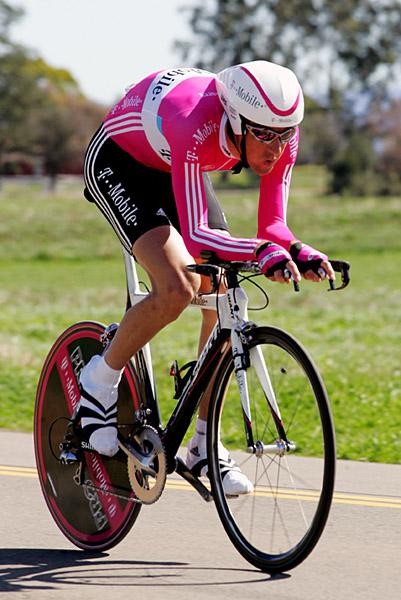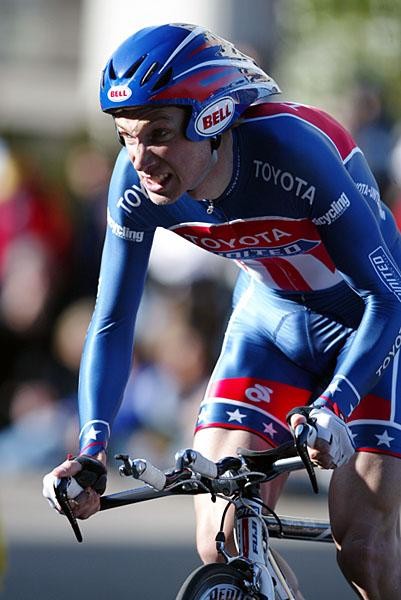Why no blood testing in North American racing?
By Kirsten Robbins with additional reporting by Tim Maloney The question remains as to why North...


By Kirsten Robbins with additional reporting by Tim Maloney
The question remains as to why North American racing has not adopted blood-testing as part of a standard doping control procedure. "I have no idea why they haven't done blood testing in the USA," T-Mobile's Michael Barry told Cyclingnews at the Tour of California. "I imagine it has something to do with financial or legal reasons. But I was talking to a lot of the guys from [US pro team] Health Net and riders who race here, and no one has been blood tested. But, I think it would be a good idea to adopt it in the North America. There is all this talk about EPO testing but the biggest and most effective controls in Europe have been the hematocrit tests and it would make sense to use those here as well."
Barry's boss, T-Mobile team manager Bob Stapleton has implemented an aggressive team anti-doping initiative for 2007 and his frank comments echo his corporate experience outside of cycling. "I think that blood testing is one of the most useful things you can do in terms of any anti-doping programs," Stapleton explained to Cyclingnews. "Building blood profiles really track athletes over time is one of the most productive uses to testing research. The problem is it raises the sophistication of collecting samples dramatically. You have to have phlebotomists that are trained in handling of blood, and the sample of blood is much more problematic and it is a big increase in cost and sophistication. It is a tremendous increase in complexity."
Stapleton continued, "I understand why some of it hasn't happened in many federations for practical reasons because it is a big challenge. But I also feel that it is the best thing we can do. I think the other aspect of anti-doping in terms of improving efficiency and effectiveness is to really do target testing of specific riders, specific events and specific times. We know that in preparation for certain events there is a doping process in place. So if we can pick athletes that are not normally tested to make things fair across all the athlete pool where everyone has the same chance of being tested that's done at times where it is more likely to have doping or blood manipulation, it should be done then and blood needs to be drawn. I think those are very clear steps that can be taken to improve the effectiveness of anti-doping."
Stapleton also explained that "I see blood testing becoming a cornerstone of the ProTour's anti-doping efforts but I think that USADA is one of the most progressive [anti-doping agencies], and I would like to see them grab this and work with it more. They are much better on the whereabouts and tracking profiles athletes than many other anti-doping agencies are. I am hoping that they can increase the use of blood testing in anti-doping for US athletes in US races."
Former US TT champion Chris Baldwin of Toyota-United weighed in on the topic. "I can't verbalize how irate it makes me that there is this war on doping and the things we do to put ourselves out there and to be tested at home or out of competition, to be in that clean group of riders, and they did not test for EPO at a race of this calibre last year!" Baldwin firmly stated. "It's out of my realm to comment on blood testing. I just wish that they did blood test and that there was more testing. There needs to be more. I am tested at home several times a month and I wish they would test more in the events. When I am tested it is always a urine test."
UCI's medical officer at the Tour of California, Shawn Farrell, is unaware of why he is sent to certain races and not others or why blood testing is not used. "I am not really in that loop," Farrell said. "The UCI sends me to do anti-doping at certain events and they tell me whether they are doing urine or blood. I know that they come here occasionally for blood testing but there is a very select group that they do that with and I have never been asked. I am not apart of the decision making process."
Get The Leadout Newsletter
The latest race content, interviews, features, reviews and expert buying guides, direct to your inbox!
Farrell added, "The UCI decided each year which races are several lists for blood testing. There is the A-list which means the UCI is going to assign the anti-doping inspectors for each specific race. There is the B-list and that means that the federation has to send someone or USADA provides the anti-doping inspector. The UCI also decides which races have to have blood testing and that is totally up to them."
Why no blood testing in the USA seems to be a question that can only be answered by the UCI. But as far as the 2007 Tour of California is concerned there have been requests made and measures taken to conduct EPO testing via urine testing conducted at the UCLA Olympic Lab. Amgen, the title sponsor of the race, has taken steps to educate the public on the correct use of their products. Michael Barry further emphasized "I think first and for most EPO is a very effective drug in fighting cancer and that is important and means a lot in the cancer community. Amgen has done a lot for our sport of cycling with the rides and the race, plus all the promotion they have done for the sport and for the cancer community is unforgettable."